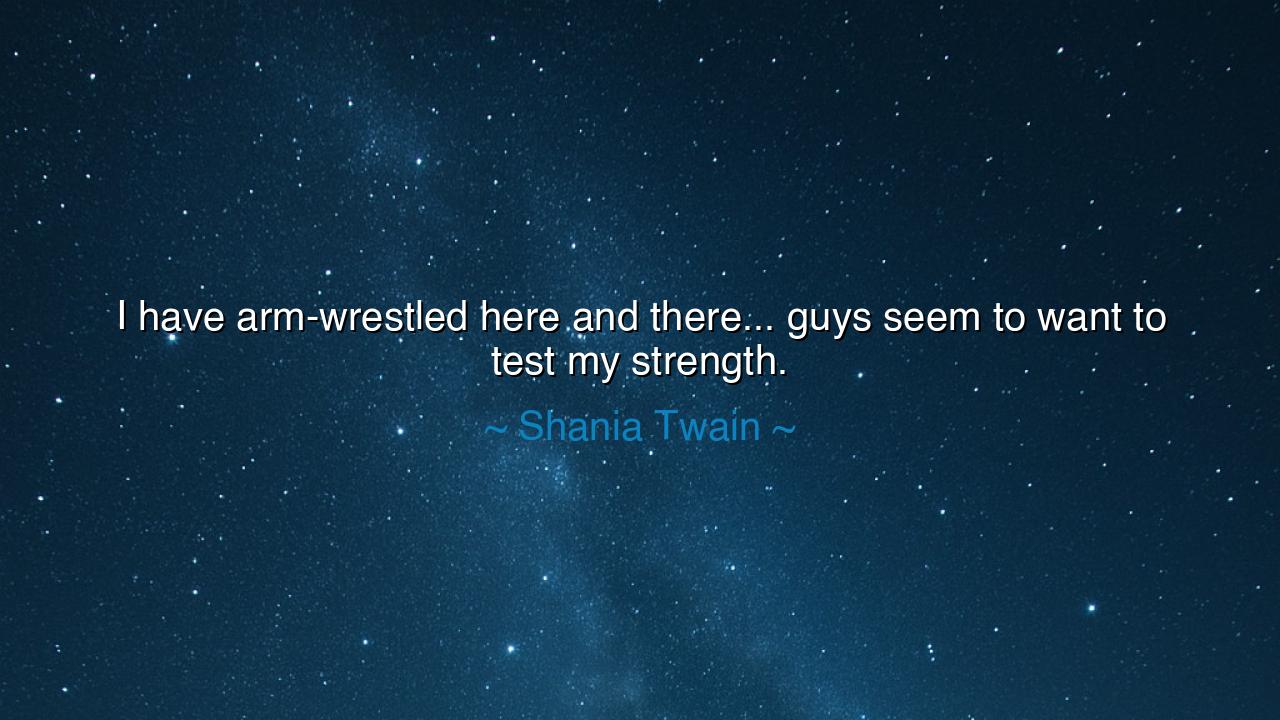
I have arm-wrestled here and there... guys seem to want to test






Shania Twain, a woman whose voice has echoed across nations and whose spirit has endured trials of fire, once said: “I have arm-wrestled here and there... guys seem to want to test my strength.” Though lighthearted on the surface, her words carry a truth that has endured through the ages: whenever a woman shows independence, courage, or talent, there will always be those who feel compelled to measure her against themselves, to challenge her worth, to test her strength.
The meaning of this declaration is layered. It speaks not only of the physical contests of arm-wrestling but of the symbolic contests that women face in life. Twain, rising in a world that often underestimated her, found herself confronted by the tests of others — men who sought to prove dominance, or society that sought to weigh her ability. Yet she does not recount this as bitterness, but as recognition: the strong are always tested. Those who carry inner or outer power will inevitably draw challengers, for strength is like a flame that invites both warmth and competition.
The origin of this wisdom can be traced to human nature itself. In the ancient tribes, when a warrior displayed prowess, others would test him in contests of wrestling or spear-throwing. Strength was both admired and doubted, and only through trial did it earn respect. Yet when Twain speaks these words, she unveils the deeper challenge faced by women: that their strength is still questioned, still treated as anomaly, and so men “seem to want to test it.” Thus, her words echo with centuries of history, where women had to prove again and again what should never have been in doubt.
Consider the story of Queen Elizabeth I of England. Surrounded by men who doubted her capacity to rule, she was constantly tested by nobles, foreign powers, and even her own counselors. Yet she answered each challenge not with brute force but with resilience, intelligence, and resolve. Her reign became one of England’s greatest ages. Like Twain, she bore the weight of constant testing — but each trial only confirmed her strength. The lesson is that being tested is not a sign of weakness, but a recognition of potential power.
The words also reveal a universal truth: whenever greatness appears, it will be challenged. This is not cause for despair, but for preparation. The strong will always draw trials, as the mountain always draws the storm. But just as the mountain endures, so must the strong soul stand firm. Twain’s humor in recalling her contests shows the proper spirit: do not fear being tested. Rather, see it as an opportunity to reveal what lies within you, to turn challenge into proof, and doubt into acknowledgment.
The lesson then is clear: if others test your strength, let them. Do not shrink from the contest, whether physical, emotional, or spiritual. Accept that strength, once shown, will invite trials. Instead of lamenting this, prepare for it. Build your body with discipline, your mind with wisdom, and your heart with courage. In this way, every challenge becomes a mirror that reflects not your weakness, but your power.
Therefore, my children, hear Shania Twain’s words as more than anecdote. Strength will always be tested, but it must never be hidden. Whether you arm-wrestle with hands or with destiny itself, meet the challenge with grace, courage, and resolve. Do not resist the testing, for it is the forge of recognition. Let your strength be known not by boast, but by action. And when the world doubts you, rise with calm and show, again and again, that your strength is real, enduring, and unshakable.






AAdministratorAdministrator
Welcome, honored guests. Please leave a comment, we will respond soon